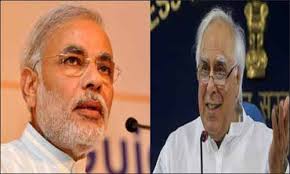 New Delhi, Mar 31: Telecom Minister Kapil Sibal today charged BJP with buckling under pressure of Gujarat Chief Minister Narendra Modi by including him in its top decision making parliamentary board, and said Modi will pose a challenge to his own party.
New Delhi, Mar 31: Telecom Minister Kapil Sibal today charged BJP with buckling under pressure of Gujarat Chief Minister Narendra Modi by including him in its top decision making parliamentary board, and said Modi will pose a challenge to his own party."The real challenge is Modi's challenge to the BJP. It is Modi who is seeking to take over the party and once Modi takes over the party there will be no BJP, because Modi's brand of politics has nothing to do with ideology," Sibal said.
He said, "This is a big challenge to the BJP and not to anyone else. The fight is between BJP and Modi. Under pressure, they have included him. The coming time will tell whether BJP will have a say or Modi."
Congress spokesperson Rashid Alvi said, "the new team's first test will be the upcoming Karnataka Assembly polls."
On inclusion of Modi's confidant Amit Shah as BJP general secretary, Sibal questioned the Opposition party's claim of morality when it appoints someone facing serious charges against him in court. He said this will lead the party to destruction.
"To make someone who is facing serious charges as general secretary will lead the BJP towards destruction. How will they make people understand that they preach morality but what they do is just the opposite," Sibal said.
The Minister said Shah is involved in very serious charges against him and is undergoing trial and has also been to jail.
"This shows the character of a party which talks about morality and yet appoints a general secretary who is undergoing a trial and facing very serious charges," he said.
Meanwhile, BJP Spokesperson Prakash Javadekar said the Gujarat Chief Minister has been there in the party's parliamentary board earlier also and has now been included again due to his gaining popularity.
"Narendra Modi is the senior-most Chief Minister of BJP and has achieved top success in his state. He is the most popular leader in BJP. He has become an icon of non-corrupt good governments," Javadekar said.





Comments
Add new comment